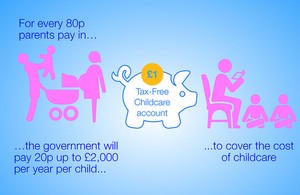
Our guide to Saving you Money on Childcare Costs!
It can take longer than you think to find the childcare that’s right for you, so start early.
Talk to other parents or family members about the childcare they use, and make sure you visit, interview and consider a range of options before working out what’s right for your family.
Give your childcare a ‘trial run’ before you’re back at work full time. You and your baby will need time to familiarise yourselves with new faces and routines so gradually building up to full days with the nursery can be the best way to settle in.
All settings will offer a settling in period, this could be a full day, half-day or consecutive planned visits away from your baby, so you can get ‘acclimatised’ emotionally.
Look4Nurseries.co.uk is a great way for a parent to search a nursery. There is a map search facility that works by you entering in your postcode, which will then search up to 5 miles to find the nearest nurseries to you!
To find a nursery near you, search http://www.look4nurseries.co.uk/
Childcare Costs 
How much you spend on childcare depends on a number of factors, including:
- Where you live
- What type of childcare you choose
- The age of your child
- Whether your employer offers any subsidised childcare arrangements
- Whether you are eligible for any financial help for your registered childcare costs through working tax credit
You could get Child Tax Credit for each child you’re responsible for if they’re:
- under 16
- under 20 and in approved education or training
You don’t need to be working to claim Child Tax Credit.
You get money for each child that qualifies and Child Tax Credit won’t affect your Child Benefit.
How much you get depends on your circumstances – you can use the tax credit calculator to work this out.
Childcare Vouchers
If you work and pay for childcare, your employer might be able to help with some of your childcare costs. Childcare vouchers are one way they can do this.
Leaflet IR115 explains more about childcare vouchers, and the other ways employers can help with childcare.
The Government’s announced a new Tax-Free Childcare scheme will replace the existing childcare vouchers programme in autumn 2015.The new scheme will be available to everyone who works more than eight hours a week, earning more than £2,420 a year (both parents must work if you’re a couple) and who pays for childcare. Unlike Childcare Vouchers, it’ll be open to the self-employed too.
Under the initiative, eligible families will get 20% of their yearly childcare costs up to £10,000 per child paid for by the Government. This could mean payments of up to £2,000 per child.
Childcare vouchers can save many parents with kids aged up to 15 over £1,000 a year on childcare. Frustratingly, they’re only available via employers, but many large and small companies take part.
The key is they enable you to pay for childcare out of your PRE-TAX and national insurance income. While this doesn’t sound much, the benefit is huge.
Free childcare for all 3 & 4 year old’s and eligible 2 year old’s.
All 3 and 4-year-olds in England are entitled to 570 hours of free early education or childcare a year. This is often taken as 15 hours each week for 38 weeks of the year. Some 2-year-olds are also
eligible.
You can start claiming after your child turns 3. The date you can claim will depend on when their birthday is.
| Child’s birthday | When you can claim |
| 1 January to 31 March | the beginning of term on or after 1 April |
| 1 April to 31 August | the beginning of term on or after 1 September |
| 1 September to 31 December | the beginning of term on or after 1 January |
Example Your child was born on 15 February 2012. They’ll become eligible for free early education and childcare from the start of term following 1 April 2015.
The free early education and childcare can be at:
- nursery schools
- nurseries on school sites
- nursery classes in schools and academies
- children’s centres
- day nurseries
- some playgroups and pre-school
- childminders
2-year-olds
Some 2-year-olds in England can also get free early education and childcare.
You must be getting one of the following:
- Income Support
- income-based Jobseeker’s Allowance (JSA)
- income-related Employment and Support Allowance (ESA)
- support through part 6 of the Immigration and Asylum Act
- the guaranteed element of State Pension Credit
- Child Tax Credit (but not Working Tax Credit) and have an annual income not over £16,190
- the Working Tax Credit 4-week run on (the payment you get when you stop qualifying for Working Tax Credit)
- Working Tax Credits and earn £16,190 a year or less
Children are also entitled to a place if:
- they’re looked after by a local council
- they have a current statement of special education needs (SEN) or an education health and care plan
- they get Disability Living Allowance
- they’ve left care under a special guardianship order, child arrangements order or adoption order
If your child is eligible, you can start claiming after they turn 2. The date you can claim will depend on when their birthday is.
| Child’s birthday | When you can claim |
| 1 January to 31 March | the beginning of term on or after 1 April |
| 1 April to 31 August | the beginning of term on or after 1 September |
| 1 September to 31 December | the beginning of term on or after 1 January |
Contact your local council to check if your child is eligible.
Grandparents
It’s estimated grandparents provide 1.7 billion hours of childcare every year for more than 1.5 million grandchildren. However, they can’t be paid for it using childcare vouchers or childcare tax credits, as they don’t provide regulated childcare.
However, there is a way for some grandparents (and others)
to gain. If you care for grandchildren aged under 12, this can qualify for Class 3 National Insurance credits (known as Specified Adult Childcare Credits). These count towards your qualifying years for a full state pension.
If you’re retiring before April 2016, you need 30 qualifying working years to get the full state pension. If you’re retiring after April 2016, that’s raised to 35 years.
If you’re looking after grandchildren, and you need extra qualifying years, it’s worth getting recognition for the childcare you provide. But, it’s not quite that simple. You need to claim these credits as they won’t be automatically added to your NI record.
For grandparents to be eligible for the National Insurance credits, working parents need to give up the NI credits they receive when they claim child benefit and transfer them to the grandparent doing the caring – they’re transferable credits.
You also need to time your claims. If you cared for a grandchild in the last tax year, you need to apply in the October after the end of the tax year for the credit to be transferred.
You need to fill in the CA9176 form and send it off to HMRC. Both you and the parent transferring the credit need to sign the form.
Job Grant
Job Grant is a work related payment you may get when you or your partner move directly from benefit into work. Find out if you qualify for a Job Grant, how much it is and how to claim it.
You may be able to get a Job Grant if, you are moving directly from benefit into work of at least 16 hours a week. This could be starting a new job, increasing the hours you work in an existing job or having a combination of jobs.
You may also get a Job Grant if your partner starts working at least 24 hours a week and as a result your benefit stops.
The work must be expected to last for at least five weeks, and you must tell Social Security or Jobs & Benefits office within 21 days of starting work.
You must also have been claiming one or a combination of the following benefits for at least 26 weeks immediately before moving into work:
- Jobseeker’s Allowance
- Income Support
- Incapacity Benefit
- Employment and Support Allowance
- Severe Disablement Allowance
- Training Allowance payments where the allowance is based on Jobseeker’s Allowance, Income Support, Incapacity Benefit, Employment and Support Allowance or Severe Disablement Allowance
Any period where you are not entitled to a payment of benefit does not count towards the 26 week qualifying period.
You will not get a Job Grant if:
- you have been signing as unemployed to receive your National Insurance contributions only
- you have been sending in medical evidence to receive your National Insurance contributions only
Job Grant – how much it is
The amount of Job Grant you will get depends on your circumstances.
You can get one of the following amounts:
- £100 for single people and couples without children
- £250 for lone parents and couples with children
How to claim Job Grant
You will automatically get Job Grant so long as you qualify.
You need to make sure you tell your Social Security or Jobs and Benefits office that you’re starting work and you must do this within 21 days of starting work.
You will be paid in the same way as you were paid benefits.
- Social Security / Jobs and Benefits Offices
- How benefits and pensions are paid
Get blog updates by email
Enter your detials:
Get updates by email
Enter your detials:








